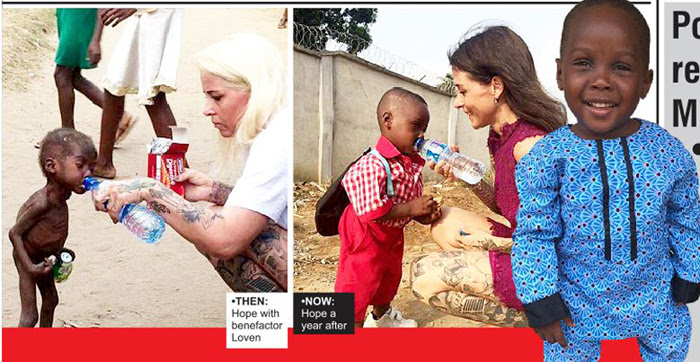

Meet Kaduna lady who’s raising 5 abandoned babies
By Maryam Ahmadu-Suka & Ra’afat Maccido, Kaduna | Publish Date: Aug 13 2016 5:00AM
n Hajiya Uwani with some of her adopted children.
Tucked
in a corner in an area called Ungwan Kaji, in Igabi Local Government
Area of Kaduna State, is a house where abandoned babies and children get
succour from. A housewife named Hajiya Uwani Yusuf Waziri, also known
as ‘Uwar Marayu’ (‘Mother of Orphans’ in Hausa), though not rich
materially, is wealthy with a kind heart, and has vowed to take care of
any abandoned baby or child brought to her doorstep.
When Daily Trust visited Uwar Marayu’s
home, there was a warm welcome from a 5-year-old who later turned out
to be one of that household’s wards. Excitedly, the mother of 11 - who’s
now a mother of 18 - gathered all the children for a photo, after
excusing the two eldest girls, as she didn’t want them to know they are
abandoned children.
The abandoned children she found over
the years and is raising were previously seven in number, including
Hajara (5), Fatima (5), Halimatu (7 months), Khadija (6 months), Zainab
(2 weeks). But Ibrahim and Jamila died recently due to pneumonia and
HIV.
Speaking passionately about the
children, Hajiya Uwani said she would not have been able to take care of
the children without the support of her husband and her biological
children. “I was born and brought up in Tudun Wada, Kaduna, before I got
married a long time ago to Alhaji Isuhu Waziri and relocated to Ungwan
Kaji. My marriage is blessed with 11 children and seven adopted ones,
and I must mention here that without the support of my husband and my
children, only Allah knows how I would have been able to take care of
the children.”
“My oldest child is 38, and the
youngest is seven, so I had time to take care of the babies most of whom
were less than a week old when they were brought to me.”
She told Daily Trust: “When the
children are found, they are taken to the house of the District Head
(Hakimi) and he then sends them to me. The children were found all
within Rigachikun including Barakallahu, Hayin Na Iya and other areas
along the Zaria expressway.”
On how she is able to cater for the
needs of the children, she said, “I do not have any standard business.
It’s just the petty businesses that we women do at home. The babies do
not take breast milk, we feed them with baby milk, and buy them
disposable diapers, which is the hardest part it all. We have tried so
many times to reach the government to come to our aid, to no avail. We
keep receiving promises especially from the local government chairmen of
different regimes, but that’s it. And as we all know, whosoever helps
another, Allah will help that person as well. I take these children
under my care for Allah’s sake with the hope of getting the reward from
Allah. That is why I am struggling and putting my best to bringing them
up.”
Asked what challenge she is facing,
she said: “The milk for the babies and diapers are my biggest challenge.
I do not want anyone to give me money, but if they can provide just the
milk and diapers, I would really appreciate it.”
On what future she wants for the
children, she said: “My desire is for Allah to give me long life so that
I can educate them, so they grow up to be successful in life, and they
will be the pride of everyone. I am very certain that even when I am no
more, my children will never disown or humiliate them because they love
them whole eartedly as if they are related by blood. That is why I pray
to get help to send them to the best schools, so they can be great.”
On mothers who abandon babies, Uwar
Marayu said they should fear Allah. “I pray to Him to guide them to the
right path. And on our part, we mothers contribute a lot to this menace,
as when our young girls become pregnant we refuse to accept them. We
only fear the shame, and forget fate. We should always accept fate, and
our children if we find them in such situation, show them love and above
all, pray for them.”
Uwar Marayu said the idea of
terminating the pregnancy, killing the baby or abandoning it is like a
go-ahead from the part of the mother for the daughter to repeat the same
mistake over and over again. “We should accept fate and guide or
children through their mistakes. Isn’t that why Allah made us parents,
to raise our kids with love and care?”
NB.TO REACH
Hajiya Uwani Yusuf Waziri, also known as ‘Uwar Marayu’ (‘Mother of Orphans’ in Hausa), CALL 08030485016
A Platform that deployed the social media links [facebook,twitter,LinkedIn,instagram] to create a FREE 'fundraising template' on behalf of indigent orphanages,orphans, widows and share same all over the world.[ See sample projects below] FOR SPONSORSHIP/PARTNERSHIP Call 234 8030485016, jeffnkwocha@gmail.com
Instead of donating less than $100 to starving inmates of orphanages home,which is not enough,you can still use the same amount to create a 'FREE FUNDRAISING TEMPLATE' that will generate over $1m per annum for them.
NB.TO REACH
Hajiya Uwani Yusuf Waziri, also known as ‘Uwar Marayu’ (‘Mother of Orphans’ in Hausa), CALL 08030485016
Funding Orphanages Inc.
Instead of donating less than $100 to starving inmates of orphanages home,which is not enough,you can still use the same amount to create a 'FREE FUNDRAISING TEMPLATE' that will generate over $1m per annum for them.


